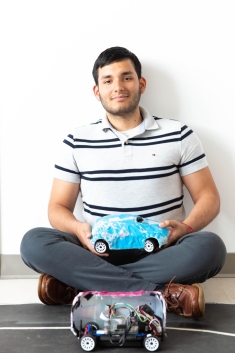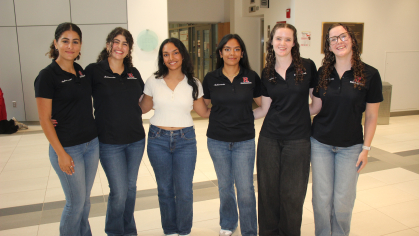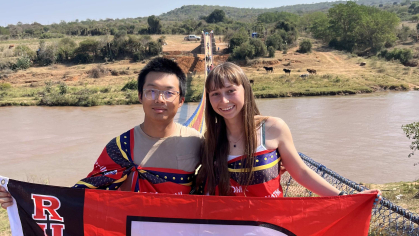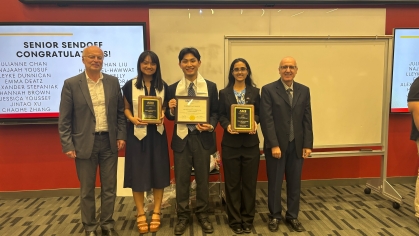Tackling Technology

As a young child in Ecuador rising junior Victor Abril was fascinated by technology and determined to learn how things worked. “I remember my mom had bought me a toy car and as soon as she gave it to me, I wanted to know how it worked,” he recalls. “I grabbed a screw driver and opened it up. My mom wasn’t too happy about that.”
Abril left Ecuador at age 12 and settled with his family in Bloomfield, New Jersey. Determined to study engineering, he received his associate’s degree in engineering from Essex County College, before transferring to Rutgers School of Engineering as a sophomore last fall. Today, while he is an electrical and computer engineering major, he has also been helping to conduct research in civil and environmental engineering professor Jing (Peter) Jin’s lab since the summer of 2018.
Rutgers leads a consortium of nine schools – including Essex County College – in the Garden State Louis Stokes Alliance for Minority Participation (GS-LSAMP) program. Funded by the National Science Foundation, GS-LSAMP works to increase the number underrepresented minority graduates in STEM fields.
“Essex would send students to other universities for summer research,” Abril explains. “I wanted to be sent to Rutgers and was last summer, where I worked in Professor Jin’s lab. After the program ended, he asked if I wanted to continue to conduct the research. I said ‘yes’ and have been conducting research in his lab ever since.”
From the start, according to Jin, Abril helped build miniature platforms for testing connected and automated vehicles, or CAVs. “Since then, he has become one of the key developers and researchers in my lab on this new alternative testing method for CAVs,” Jin says. “He has significantly upgraded my mini-vehicle platforms and has also helped organize several K-12 educational events at local elementary schools. “
Jin’s Smart Mobility Lab is currently building a miniature smart city to test autonomous and connected vehicles that can drive themselves and communicate with each other. This summer, Abril is part of a team that includes another undergraduate and a summer GS-LSAMP student.
While schools such as the University of Michigan have built real-size platforms for this kind of testing, Abril notes that the Rutgers small-scale platform is easier and less expensive to build and maintain. Because it uses a simulator with a steering wheel and brake and accelerator pedals, there is no need for a human driver – and no risk for liability.
“We’re trying to replicate a city environment and build the platform to enable research,” says Abril. “The platform is divided into three parts, so we’re building a miniature controlled toy, a platform city, and communications network.”
Not surprisingly for someone who took his toy car apart as a child, Abril is working on building the vehicle and will continue this work during the coming academic year.
“In the coming semester, Victor will continue to participate in the research and development for building the ‘digital sibling’ of real-world testing grounds,” says Jin, who is preparing to establish a smart mobility testing ground in New Brunswick later this year.
Abril has been conducting research since he was a freshman at Essex County College, when he worked on a summer artificial intelligence project at Stevens Institute of Technology involving applications of deep learning.
As a Rutgers student, Abril especially values all the research opportunities that are available to undergraduates. “You can do research outside of your department here,” he says. “You can ask professors working on projects outside of your department if you can work on them if they align with your interests.”
Abril ultimately hopes to leverage his Rutgers cross-disciplinary training and experience in electrical and civil and environmental engineering to pursue a Ph.D. “I’d like to work on automation and hopefully obtain a job in the automation industry conducting research on automated robots,” he says.


